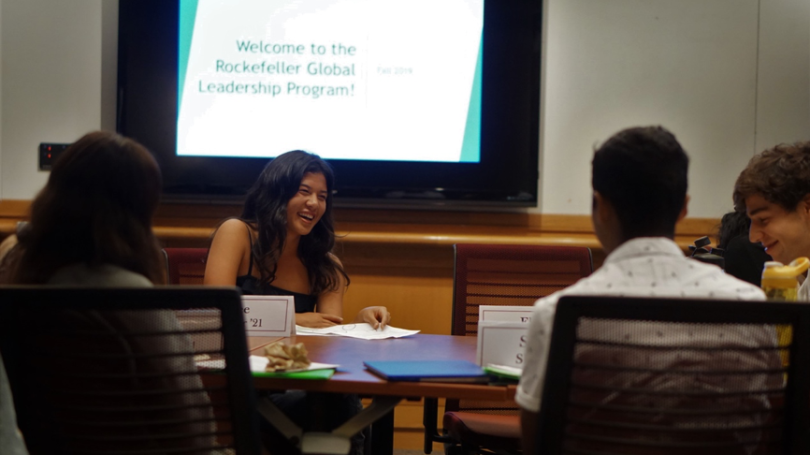
- Public Policy
- Leadership
- Funding
- News & Events
- About the Center
Back to Top Nav
Back to Top Nav
Back to Top Nav
Back to Top Nav
Each fall, winter, and spring, the Rockefeller Global Leadership Program (RGLP) brings together student leaders to increase their understanding of global leadership and intercultural competency. Through weekly sessions with speakers and a culminating experience to either Boston or Montreal, the students are able to learn about themselves and cross-cultural leadership.
Fall 2019 participants were asked to write a blog post, reflecting on the topics and lessons learned throughout the program. Below are reflections from the Fall 2019 cohort who spent a weekend in Montreal as part of their culminating experience.
Dr. Milton Bennett created the Developmental Model of Intercultural Sensitivity (DMIS) to explain our reaction to different cultural situations. At RGLP's first session, we discussed this model concerning global conflicts and current affairs. On a personal level, this model resonated with my own intercultural experience shifting from Canadian society to the heterogeneous, yet still American, institution Dartmouth provides.
The first stage of DMIS is Denial. And at first, I believed what you may be thinking, that Canadians are not so different from Americans. But as I questioned where to place my hand over my heart during the National Anthem and take offense at Americans' fast-paced lifestyle and direct communication style, the friction of adjusting became undeniable. After recognizing this difference, I entered the second stage: Defense. Wherein, I dearly missed my old culture.
Minimization comes third in the process, where the learner begins to find commonalities between themselves and others. I think it was only after my first term at Dartmouth, that I entered the acceptance stage of DMIS. I began to understand and appreciate many aspects of American culture, particularly in terms of productivity and efficiency. I learned that to better integrate with American society, I would have to change myself, at least in some ways. This sort of adaptation to other people is something that I’ve always struggled to better. That’s why the final stage of DMIS is particularly comforting – that is, the goal to retain your own culture while respectfully engaging and empathizing with other worldviews.
Growing up, we are told to never change ourselves for others and to “stay true to who we are.” When our sense of self relies on our formative context, it makes sense that we are subject to evolve when introduced to cultures with other offerings. This model seems to expand this simplistic adage and better this idea of retaining one’s true self without restraining personal growth spurred by different cultures.
This winter, I will be traveling to India. I look forward to engaging with Indian culture with this mindset and the other skills RGLP provides.
-Written by Bee Hollyer ’21, Fall 2019 RGLP Participant
Disclaimer: The views and opinions expressed here are the author’s own and do not necessarily represent the views and opinions of the Rockefeller Center or constitute an endorsement by the Center.